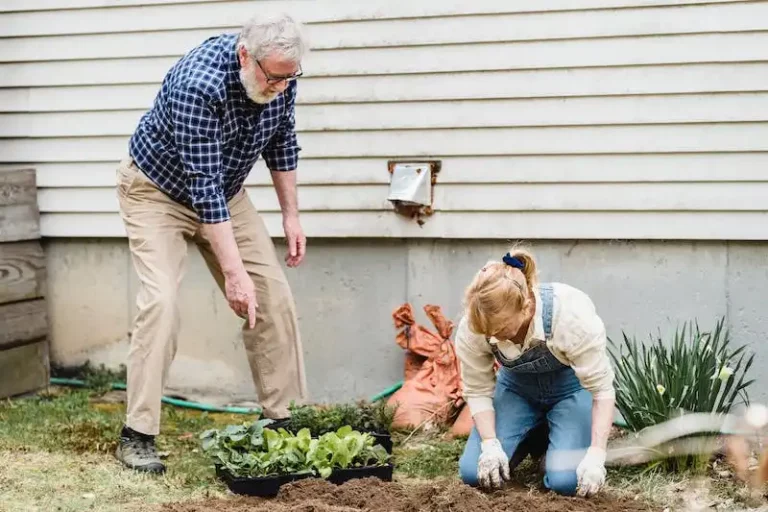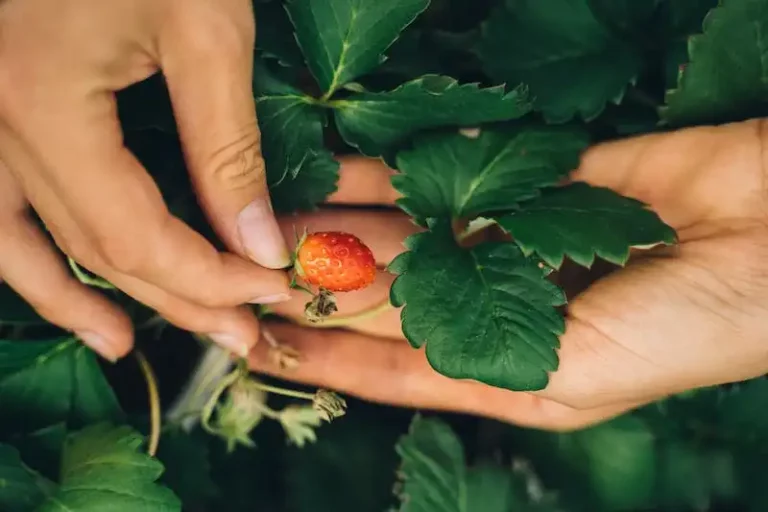Growing spring onions is a great way to add flavor and versatility to your culinary repertoire. These quick-growing crops are well worth the effort, as they can be harvested in as little as 6-8 weeks. Whether you choose to grow from bulbs or seeds, with a little tending and proper conditions, you can enjoy a continuous supply of fresh spring onions throughout the season.
When it comes to planting spring onions, it’s important to find a sunny spot in your garden with well-draining soil. Before sowing, make sure to thin out any weeds and amend the soil with organic matter or a general-purpose fertiliser. Once the onions have sprouted, thin them out to about 5-10cm apart to give them enough space to grow.
To keep your spring onions well-watered, make sure to water deeply once a week or more often during hot and dry periods. You can also use a spray bottle to mist the leaves occasionally, as they prefer slightly humid conditions. It is important not to overwater, as this can cause the bulbs to rot.
As your spring onions reach full growth, you can start harvesting them by gently pulling them from the ground. Alternatively, you can leave some plants to flower, which is a beautiful sight to behold. The harvested onions can be stored for several weeks in a cool, dry place. If you would like to have a continuous supply, you can sow seeds every few weeks.
If you’re encountering any issues or pests with your spring onions, there are some troubleshooting tips you can try. Pests such as aphids, onion maggots, and thrips can cause damage to the leaves and bulbs. To prevent these pests, you can use insecticidal soap or natural predators, such as ladybugs. Diseases, such as onion white rot or downy mildew, can be prevented by practicing good crop rotation and avoiding overwatering.
In conclusion, growing spring onions is a rewarding endeavor. Not only do they add a delicious flavor to dishes, but they are also easy to cultivate and can be enjoyed year-round. So, why not give it a try? Follow these tips and soon you’ll have a bountiful harvest of fresh, flavorful spring onions to enjoy in your kitchen!
Growing Spring Onions
Spring onions, also known as scallions or green onions, are a great addition to any garden. They are easy to grow and can be used in a variety of dishes. Whether you are a seasoned gardener or just starting out, growing spring onions is a quick and rewarding project.
First, choose a variety of spring onions to plant. There are many different types to choose from, including white and red varieties. They can be grown from seeds or young plants. If you choose to grow from seeds, sow them directly into well-drained soil. Make sure the soil is already prepared by adding some organic matter or compost.
Spring onions are fast-growing plants that require regular watering. Keep the soil moist, especially during dry conditions. However, be careful not to overwater, as this can cause issues with the growth of the plants. A quick watering guide is to water the onions deeply once a week, or more frequently if needed.
When the spring onion seeds begin to sprout, thin them out to allow for proper growth. This will help prevent overcrowding and ensure each onion has enough space to flourish. As the onions continue to grow, keep an eye out for any pests or diseases that may affect them. If an issue arises, there are many resources available online with step-by-step guides on how to treat common problems.
When it comes time to harvest the spring onions, you can start picking them as soon as the green tops are large enough to use. Harvest them by gently pulling the onion out of the ground, or if you prefer, you can cut them off at the base. Spring onions can be harvested all year round, making them a useful addition to any kitchen garden.
Overall, growing spring onions is a rewarding and relatively low-maintenance task in the world of gardening. With the right conditions and care, you can have a continuous supply of fresh and flavorful spring onions. So why not give it a try and enjoy the satisfaction of growing your own onions?
How to Grow Spring Onions Scallions Step-by-Step Photos
Spring onions, also known as scallions, are a versatile and delicious addition to any garden. They can be used in a variety of dishes and provide a fresh, onion-like flavor. If you’re new to gardening or just want to try something different, growing spring onions scallions can be a great choice. In this guide, we’ll show you how to grow spring onions scallions step-by-step, with helpful photos to guide you along the way.
Step 1: Choose the Right Variety
Before you start planting your spring onions, it’s important to choose the right variety. There are many different types of spring onions scallions available, so do some research to find which one will work best for you. Some popular varieties include ‘White Lisbon’ and ‘Evergreen Hardy’, but there are many others to choose from.
Step 2: Prepare the Soil
Spring onions scallions prefer well-drained soil, so make sure to prepare your garden bed accordingly. Remove any weeds or grass, and then loosen the soil with a fork or tiller. If your soil is heavy or clay-like, adding some sand or organic matter can help improve drainage.
Step 3: Sow the Seeds
It’s time to sow your spring onion scallion seeds! Make shallow furrows in the soil, about 1/4 inch deep, and space them about 1 inch apart. Gently cover the seeds with soil and water them well.
Step 4: Watering and Care
Water your spring onions scallions regularly, making sure to keep the soil evenly moist. Avoid over-watering, as this can lead to rotting. Mulching around the plants can help conserve moisture and prevent weed growth.
Step 5: Harvesting
Spring onions scallions can be harvested when they reach the desired size, usually about 8-12 weeks after sowing. To harvest, simply pull the plant out of the ground, or cut the leaves just above the soil level. The tops can be used as green onions, while the bulbs can be used as regular onions.
Tips and Troubleshooting
Growing spring onions scallions is generally easy, but here are a few tips to ensure success:
– Plant your spring onions scallions in well-drained soil, as they don’t tolerate wet conditions.
– If you’re short on space, spring onions scallions can be planted in containers or even in between other plants.
– Watch out for pests and diseases, such as onion flies and onion root rot. Regularly inspect your plants and take appropriate action if an issue arises.
– Spring onions scallions are fast-growers, so it’s worth sowing a new batch every 2-3 weeks for a continuous harvest.
– If you’re growing spring onions scallions in the winter, choose a variety that is cold-hardy.
– Don’t throw away the white bottoms of your spring onions scallions! They can be re-grown by placing them in a glass of water until roots and new shoots appear.
With these step-by-step instructions and helpful photos, you’ll be well on your way to growing your own spring onions scallions. Enjoy the satisfaction of harvesting your own fresh, flavorful onions throughout the year!
How to grow spring onions
Spring onions, also known as green onions or scallions, are a versatile and easy-to-grow vegetable that can add a burst of flavor to your dishes. Whether you have a full garden or just a small balcony, growing spring onions is a great way to get fresh, tasty produce right at home.
The first step in growing spring onions is to choose the right variety. There are many different types of spring onions to choose from, including white, yellow, and red varieties. Thomasw_lrd and Morgan are two popular varieties that are well-suited to home gardening.
Once you’ve chosen your variety, it’s time to plant your spring onions. You can either sow seeds directly into the ground or start with transplants. If you choose to sow seeds, make sure to plant them in well-drained soil and water them regularly. If you prefer to start with transplants, simply dig a small hole and place the plants in, making sure to space them about 4-6 inches apart.
As your spring onions start to grow, it’s important to keep an eye on their watering needs. Spring onions prefer to be kept moist, so make sure to water them regularly. However, be careful not to overwater, as this can cause the bulbs to rot. If you notice the soil becoming waterlogged, reduce the frequency of your watering.
During the growing season, it’s important to keep your spring onions well-tended. This includes thinning the plants to allow for proper airflow and preventing overcrowding. Thinning involves removing some of the plants to create space for the remaining ones to grow. It’s also important to keep an eye out for pests and diseases, as they can quickly damage your crop. If you notice any pests or signs of disease, take immediate action to address the issue.
Spring onions are typically ready to harvest in about 8-12 weeks from sowing. You can harvest them at any point in their growth, depending on your personal preference. Some people prefer to harvest them when they are still small and tender, while others prefer to wait until they have reached their full size. To harvest, simply pull the onions out of the ground or cut them at the base.
After harvesting, you can store your spring onions for later use. They can be stored in the refrigerator for up to a week or frozen for longer storage. If you choose to freeze them, it’s best to blanch them first to preserve their flavor and texture.
In conclusion, growing spring onions is a rewarding and enjoyable experience. With proper care and attention, you can have a bountiful harvest of fresh, flavorful onions to enjoy throughout the season. So why not give it a try? Start growing your own spring onions today!
Sources and further reading:
- How to Grow Spring Onions – a step-by-step guide on growing spring onions
- Spring Onions: A Planting and Harvesting Guide – tips and tricks for growing spring onions in general
For more information on tending to your spring onions, great troubleshooting guides, and other gardening tips, be sure to check out these links:
- Thomasw_lrd: Spring Onion Pests and Diseases
- Morgan: Spring Onion Watering Guide
Happy gardening to you, and may your spring onion harvest be plentiful and delicious!




